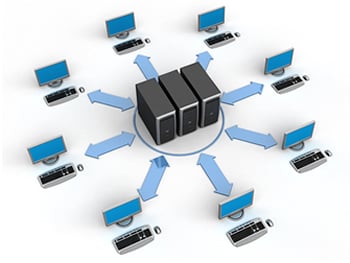Citrix XenDesktop 5.5 and XenDesktop 5.6 go to great lengths to improve the end-user and administrator experience. Enhancements to virtual desktop performance and usability top the list of new XenDesktop features.
So, how can the highly hyped Citrix XenDesktop 5.5 and XenDesktop 5.6 features improve virtual desktop performance for admins and network managers? The main enhancements to XenDesktop 5.6 include full integration with personalization technology from RingCube and increased integration with Microsoft System Center 2012. In Citrix XenDesktop 5.5, the talk of the town was HDX MediaStream, a technology that incorporates the following capabilities:
Second-generation Flash redirection: In XenDesktop 5.5, you can redirect Adobe Flash content to user devices for local rendering in many more cases than before, resulting in even higher server scalability and a better user experience. Flash redirection also now supports WAN-connected users.
Server-rendered video: For multimedia content that's rendered server-side, Citrix XenDesktop 5.5 eliminates the need to configure complex policies under different network conditions to get the best performance. HDX MediaStream automatically adjusts to the effective network bandwidth to use the level of compression that delivers the best video experience (image quality and frame rate) while displaying non-video regions, such as text, at full clarity.
Windows Media redirection: Citrix XenDesktop 5.5 also introduces a new end-to-end flow control and frame dropping capability. This XenDesktop feature improves the user experience when the bandwidth available for viewing a Windows Media video (WMV, MPEG, AVI, DivX, etc.) is less than what the video's bit rate requires. That's an issue many customers experience as videos are recorded at higher resolution.
Citrix XenDesktop 5.5 allows users to run multimedia redirection in more access scenarios, further reducing server CPU consumption. Priority is given to smooth audio playback and audio-video synchronization at the expense of the video, so the features drops video frames when the available bandwidth is too low.
Multi-stream ICA: Citrix XenDesktop 5.5 provides the option to deliver ICA protocol traffic over multiple streams: four Transmission Control Protocol/Internet Protocol streams and one User Datagram Protocol (UDP)/Real-time Transport Protocol (RTP) stream for audio. This XenDesktop feature improves virtual desktop performance by giving full flexibility for Quality of Service routing over the network and providing superior audio quality when there is packet loss or congestion.
Citrix Receiver for Windows: Citrix XenDesktop 5.6 improved mobile application access by making it easier for XenApp to optimize app interfaces for use on smartphones and tablets. Various enhancements in Citrix Receiver (formerly the Citrix online plug-in) offer additional benefits for softphone users and unified communications clients:
- UDP and RTP support
- Improved multi-tasking with real-time applications
- Smoother audio when network latency fluctuates
- Improved echo cancellation when using speakers and a microphone
Citrix XenDesktop 5.5 also comes with enhanced HDX Broadcast technology, which reduces workloads and improves virtual desktop performance. These new XenDesktop features include:
- A 30% drop in bandwidth consumption and service-side CPU utilization when using low-bandwidth connections.
- Remote Desktop Protocol (RDP) support in HDX Broadcast has been enhanced to support RDP 7.1 with Microsoft RemoteFX.

Citrix also improved virtual desktop performance with better HDX RichGraphics, which sports enhancements such as:
Microsoft RemoteFX support: Microsoft RemoteFX, a feature in Windows Server 2008 R2 Service Pack 1, uses server-side graphics hardware acceleration to deliver the full Windows 7 Aero and multimedia experience over a LAN-like connection.
Citrix XenDesktop 5.5 supports RemoteFX using enhancements to RDP support in HDX Broadcast and to Citrix Receiver for Windows. These changes in XenDesktop features is the first phase of a vision and collaboration Citrix and Microsoft announced in March 2010.
Windows 7 Aero redirection: Aero redirection uses client-side graphics hardware acceleration to deliver Windows 7 Aero (including glass effects, Flip 3D and Aero Peek) over a LAN-like connection. Using the DirectX 9 graphics processing capabilities of the user's device (a Windows XP, Vista, or 7 PC, or higher-end thin client), Aero redirection delivers an outstanding user experience that truly feels "local," if not better.
Three-dimensional Pro enhancements: In Citrix XenDesktop 5.5, HDX 3D Pro adds full multi-monitor support for Windows 7 desktops. This improvement to virtual desktop performance extends remote access to professional 3-D graphics applications and very large models to enable full desktop replacement. HDX 3D Pro also offers limited support for multi-monitor access to Windows XP desktops.
Other enhancements include support for graphics processing unit-accelerated deep compression with Nvidia's GPU technology, codenamed Fermi, and the addition of XenDesktop policies enabling administrator control of the end-user image quality configuration tool.
HDX Plug-n-Play: New capabilities for the HDX Plug-n-Play feature include support for WAN-connected scanners and Japanese and Korean keyboards. Citrix XenDesktop 5.5 also improves the usability of removable storage devices. Client Drive Mapping now supports read-only access on all Virtual Desktop Agents, and it also supports the Universal Naming Convention path on Virtual Desktop Agents in Windows 7 and Windows Vista environments.
With these added XenDesktop features, Citrix XenDesktop 5.5 and XenDesktop 5.6 deliver an improved end-user experience and virtual desktop performance, while reducing processing overhead and bandwidth consumption.
To find out more about Citrix XenDesktop, download the brochure here.
Source: Tech Target
 English
English  Vietnamese
Vietnamese 

